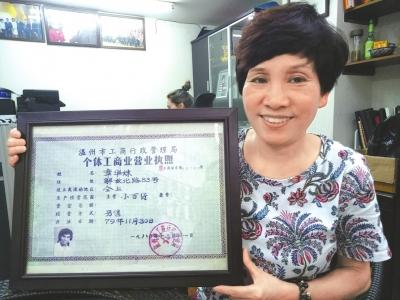China's first licensed vendor, 39 years later
- By Wu Jin
 0 Comment(s)
0 Comment(s) Print
Print E-mail China.org.cn, May 30, 2018
E-mail China.org.cn, May 30, 2018
Zhang Huamei, a 58-year-old female entrepreneur and the owner of Huamei Costume Accessories Co. Ltd. in Wenzhou, the birthplace of modern Chinese entrepreneurship in southeastern Zhejiang province, was the first private business vendor licensed in the nation, following the adoption of the "reform and opening up" policies almost 40 years ago.

Born the seventh child in a blue-collar family, Zhang dropped out of a secondary school and became an unlicensed vendor in 1970s, selling trinkets and accessories near her home.
Hoping to improve her family's living conditions with one to two yuan of extra income per day as a vendor – almost equaling the money they spent for the whole family's food per day, Zhang never expected that a dramatic transformation was coming that would change her destiny. A debate on whether China should adopt private business ownership was heating up, and was eventually settled in the affirmative in December of 1978 at the Third Plenary Session of the 11th Central Committee of the Communist Party of China .
Nor did Zhang expect that her foray as a private vendor would consequently begin her career as an entrepreneur, nearly 40 years after being named the first licensed private vendor in the country.
Her story began with an incident that took place in 1979.
One day, when Zhang was selling her goods near her home as usual, she was shocked to see an administrative official approaching her. Fearing that he may confiscate her goods, she packed up her belongings and prepared to run.
However, the official stopped her, saying that he had just come to inform her that the country was now allowing individuals to set up their own businesses and asked her to register with the local industrial and commercial administration to run her bushiness legitimately. Then he left.
After telling the news to her family, Zhang applied for business license by submitting her personal information, two photos and a description of her business to the administration the next day.
In December of 1980, she became the first of more than 2,000 vendors in Wenzhou - 80 percent of whom were jobless at the time - to receive a license to operate a private business.
Chen Shouzhu, the former director of the self-employed business division of the Wenzhou Industrial and Commercial Administration Bureau, recalled that there were 1,844 vendors in Wenzhou licensed for the first time in 1980, a development which soon captured the attention of the entire country.
"At that time, since there were no official samples of a license for private businesses, we designed one written with Chinese brushes and had 20,000 copies printed," Chen said.
According to Chen, in 1982 they issued more than 100,000 licenses to private businesses owners.
With a license in hand, Zhang started to upgrade her business. She paid to renovate the first floor of her house, changing it into a store, where the buttons and key chains she managed to sell were displayed in counters.
In 1982, she encountered a turning point in her life. Her brother was badly injured in a car accident, and his family had a substantial medical bill to cover.
In an arrangement orchestrated by her father, Zhang handed over her business to her sister-in-law.
However, by 1985, Zhang and her husband were heavily in debt after moving to a new house that they had bought for 9,000 yuan, and were living solely on her husband's meager income, which was less than 60 yuan a month.
Zhang decided to become a businesswoman again. She and her husband rented a shop on North Jiefang Road and started a business selling zippers.
"We didn't know at that time what the most lucrative business in the market was, but I just noted that there were few people selling zippers and accessories for formal suits, so I asked my husband to purchase some from Guangzhou," Zhang recalled, referring to Guangdong province's capital city.
It proved to be a wise decision, and Zhang and her husband paid off all their housing debt in less than two years.
In the ensuing years, they tried many different businesses, such as selling sweater accessories and leather shoes. However, the latter caused the couple to meet their Waterloo, undergoing a great loss in a market they were unfamiliar with and incurring a debt of tens of thousands of yuan.
To recover from the setback, Zhang decided to focus on selling buttons following the latest fashion trends. In doing so, she rescued her business from the brink of bankruptcy.
The twists and turns of Zhang's entrepreneurship transformed her into an astute businesswoman. In 2000, following the renovation of the city, Zhang and her husband moved to West Renmin Road, a commercial center of the city, to establish new shops totaling 200 square meters. They founded their company with design, sales and stockpile divisions in addition to several assembly lines. Each year, the company generates millions of yuan in revenue.
Zhang, now 58 years old, announced her retirement a few months ago and passed on the business to her son. However, she continues to visit the company each working day, overseeing the business she started from scratch.






Go to Forum >>0 Comment(s)